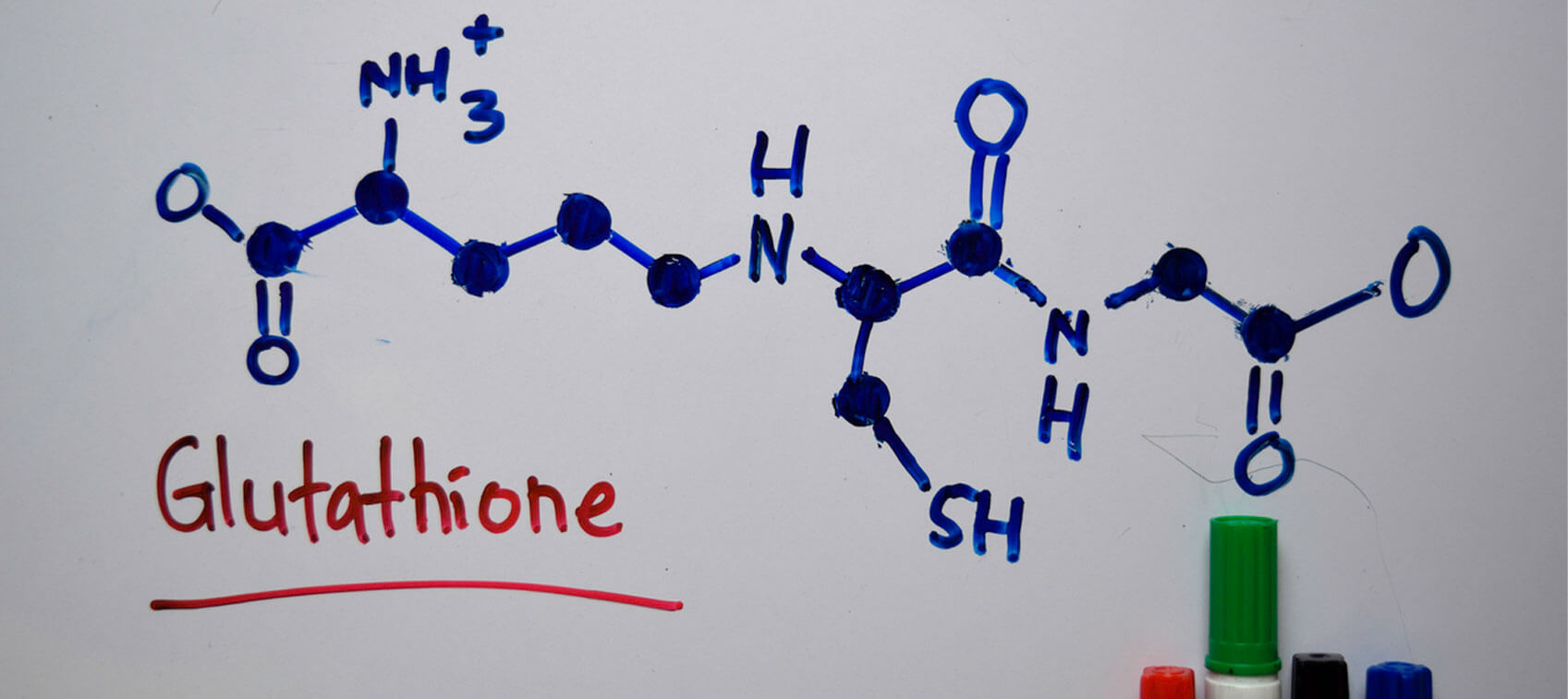
Glutathione is a tripeptide. A peptide is a compound that breaks down into two or more amino acids. Since glutathione is a “tri” peptide it is composed of three amino acids, namely glycine, glutamic acid, and cysteine. Glutathione is present in every cell of your body and essential for life itself.
The the major functions and benefits of glutathione are:
- Regulating protein and DNA biosynthesis and cell growth;
- Maintaining the strength and integrity of cell membranes;
- Enhancing the functions of the immune system by increasing the production of disease-fighting blood cells called lymphocytes;
- Detoxifying external compounds like environmental pollutants and drugs; and
- Acting as an extremely powerful antioxidant, protecting cells against free radical damage.
Given these essential functions of glutathione, it isn’t too surprising that low glutathione levels have been linked to a wide variety of ailments, including accelerated aging, cancer, Alzheimer’s, Parkinson’s, and cardiovascular disease. We also know that a lack of glutathione in AIDS patients is responsible for the wide-scale free-radical damage that destroys immune cells and suppresses the immune system.
Glutathione performs important functions in the eyes too. It aids in transporting the minerals calcium, potassium, and sodium in and out of the lens. It also protects certain proteins from oxidizing and slows the breakdown of DNA within the lens. Without adequate amounts of glutathione, each of these processes will continue unabated and lead to a hardened, inflexible lens. Any adverse change in the lens of your eye is a fairly reliable indication that your glutathione levels are declining, and this includes the formation of cataracts.
Another example of glutathione’s important role in health comes from a study performed by researchers at Louisiana State University who were working with mice genetically engineered to develop inflammatory bowel disease. Five weeks before the mice began to experience intestinal inflammation, the researchers noted a sharp drop in glutathione. When the inflammation appeared, glutathione gut tissue levels had dropped 80 percent. And as their tissue levels of glutathione increased, the inflammation subsided.
Along with aging in general, glutathione levels may drop as a result of heavy metal exposure. These metals steal sulfur groups from enzymes, protein compounds and/or peptides such as glutathione S-transferase (GST), an enzyme dependent on glutathione that studies have shown provides protection against the spread of cancer cells.
How to Increase Glutathione Levels
If you’re really serious about living the longest, fullest life possible, increasing your glutathione levels appears to be an excellent starting point.
However, I have one important caveat: Although raising glutathione levels may help protect against developing cancer, it is not recommended that you attempt to raise levels during the active phases of cancer. This is because glutathione augments the functions of every cell in the body and makes no distinction between normal cells and those of a cancerous tumor. Attempts to boost glutathione can be undertaken following a treatment program where the cancer was determined to be in remission.
- Supplement with either glutathione tripeptide (500 mg daily) or the precursor of glutathione, N-acetylcysteine (NAC, 500–600 mg daily). N-acetycysteine is metabolized or converted by the body into glutathione. In one European study, 600 mg of NAC a day was given to former cancer patients for a period of three months. Upon evaluation, blood plasma levels of glutathione increased by 38 percent. It is interesting to note that this large, ongoing European study is testing for ways to prevent throat and lung cancer from recurring in patients whose primary tumor has been cured. The researchers felt that N-acetylcysteine and glutathione could accomplish this by protecting the DNA from free radical damage. After three years of the therapy, researchers believe NAC prevented early damage to DNA, while glutathione had a more long-term protective effect.
- Take other supportive nutrients. Check your multivitamin to make sure it contains riboflavin (vitamin B2), selenium, zinc, vitamin C, and magnesium. Riboflavin assists in recycling the enzymes created from glutathione and selenium aids in their formation. Vitamin C helps "recycle" used glutathione. Zinc and magnesium also appear to be necessary in glutathione enzyme production.
- Add whey protein powder to your daily routine. Whey has a very high content of sulfur-containing amino acids (such as cysteine) that are necessary for the biosynthesis of glutathione. Research indicates that, by consuming whey protein, you can effectively raise your gluthathione levels.
- Increase your consumption of glutathione-rich cruciferous vegetables. The best glutathione food source is Brussels sprouts. Others include cauliflower, broccoli (particularly the flowers, not the stem), cabbage, kale, bok choy, cress, mustard, horseradish, turnips, rutabagas, and kohlrabi. In addition to the cruciferous vegetables, both garlic (Allium sativum) and the ripe seeds of the common green bean (Phaseolus vulgaris) help make glutathione and its dependent enzymes more effective.
- Use rosemary. At the University of Illinois, researchers found that including the herb rosemary in the diet could increase GST enzyme activity. The strongest activity resulted when an extract of the herb was given by injection, but ingesting the herb extract orally (at concentrations of 0.25 to 1.0 percent of the diet by weight) showed a 3.5- to 4.5-fold increase in GST activity, which is very significant.
It appears that the glutathione level could turn out to be one of the premiere biological “markers” of aging. Every major function of glutathione coincides with what we call aging. Glutathione levels seem to give a pretty good indication of the overall current health of an individual, as well as provide an indication of potential longevity. Take action now to boost your levels of this master antioxidant!


